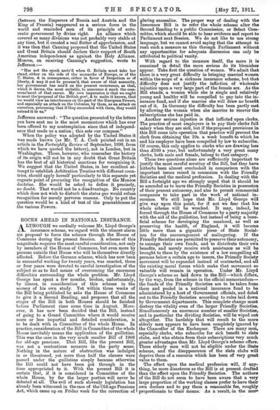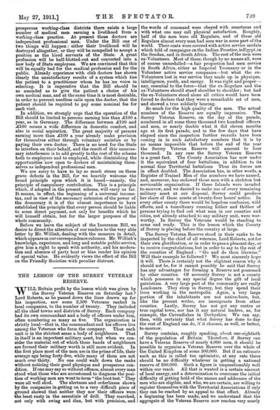ROCKS AHEAD IN NATIONAL INSURANCE. A LTHOUGH we cordially welcome Mr.
Lloyd George's insurance scheme, we regard with the utmost alarm his proposal to force the scheme through the House of Commons during the present Session. A scheme of this magnitude requires the most careful consideration, not only by members of the House of Commons, but even more by persons outside that House who will be themselves directly affected. Before the German scheme, which has now been in successful working for twenty years, was enacted, three or four years were devoted to careful investigation of the subject so as to find means of overcoming the enormous difficulties surrounding the whole problem. Mr. Lloyd George has spent a few months, broken, unfortunately, by illness, in consideration of this scheme in the secrecy of his own study. Yet within three weeks of the Bill being published he asks the House of Commons to give it a Second Reading, and proposes that all the stages of the Bill in both Houses should be finished before Parliament rises some time in August. More- over, it has now been decided that the Bill, instead of going to a Grand Committee where it would receive more or less impartial and detailed consideration, is to be dealt with in Committee of the whole House. In practice, consideration of the Bill in Committee of the whole House inevitably means the application of the guillotine. This was the ease in the very much smaller Bill of 1908 for old-age pensions. That Bill, like the present Bill, was not a contentious measure in the party sense. Nothing in the nature of obstruction was indulged in or threatened, yet more than half the clauses were passed under the guillotine simply because otherwise the Bill could not have been got through in the time appropriated to it. With the present Bill it is certain that, if it is considered in Committee of the whole House, by far the larger portion will never be debated at all. The evil of such slovenly- legislation has already been witnessed in the case of the Old-age Pensions Act, which came up on Friday week for the correction- of glaring anomalies. The proper way of dealing with the Insurance Bill is to refer the whole scheme after the Second Reading to a public Commission, or Select Com- mittee, which should be able to hear evidence and report to Parliament next Session. We do not like to use strong language, but we cannot avoid saying that the attempt to rush such a measure as this through Parliament without any opportunities for adequate discussion can only be attributed to political vanity.
With regard to the measure itself, the more it is examined in detail the more serious do its blemishes appear. Take first the question of women. We admit that there is a very great difficulty in bringing married women within the scope of a sickness insurance scheme, but that difficulty does not justify the infliction of wholesale injustice upon a very large part of the female sex. As the Bill stands, a woman while she is single and relatively young and healthy will be compelled to pay into the in- surance fund, and if she marries she will draw no benefit out of it. In Germany the difficulty has been partly met by allowing the woman when she marries to recover the subscriptions she has paid in. Another serious injustice is that inflicted upon clerks. The practice of most employers is to pay their clerks full salary when they are sick, but if the proposed provisions in this Bill come into operation that practice will prevent the clerk from obtaining the 10s. a week benefit to which he and his employer have been compelled by law to subscribe. Of course, this only applies to clerks who are drawing less than £160 a year, but unfortunately a very great many clerks, both male and female, belong to that category.
These two questions alone are sufficiently important to justify the most careful scrutiny of the Bill, but they have hitherto been almost overlooked in comparison with the important issues raised in connexion with the Friendly Societies and the medical profession. In dealing with the Bill a fortnight ago we strongly urged that it should be so amended as to leave the Friendly Societies in possession of their present autonomy, and also to permit commercial companies to take part in the work of national in- surance. We still hope that Mr. Lloyd George will give way upon this point, for if not we fear that his whole scheme will be wrecked. It may, indeed, be forced through the House of Commons by a party majority with the aid of the guillotine, but instead of being a bene- ficial scheme for developing the manhood, as well as preserving the health, of England, it will become little more than a gigantic piece of State Social- ism for the encouragement of malingering. If the Friendly Societies are permitted to preserve their autonomy, to manage their own funds, and to distribute their own benefits, and merely receive such assistance as will be brought to them by the existence of a law compelling all persons below a certain age to insure, the Friendly Society movement will be expanded instead of contracted, and all the existing moral forces which make that movement so valuable will remain in operation. Under Mr. Lloyd George's scheme as laid down in the Bill—which differs, by the way, from the scheme in the official memorandum— the funds of the Friendly Societies are to be taken from them and pooled in a national insurance fund to be administered by a host of Government officials, and doled out to the Friendly Societies according to rules laid down by Government departments. This complete change must destroy the vitality even of the larger Friendly Societies. Simultaneously an enormous number of smaller Societies, and in particular the dividing Societies, will be wiped out altogether. The hardship that will result to the more elderly men appears to have been completely ignored by the Chancellor of the Exchequer. There are many men, especially clerks, who subscribe for sick benefit to slate clubs, and who obtain from their subscriptions very much greater advantages than Mr. Lloyd George's scheme offers. These elderly men will not be eligible under the State scheme, and the disappearance of the slate clubs will deprive them of a resource which has been of very great value to them.
The effect upon the medical profession will, if any- thing, be more disastrous as the Bill is at present drafted than the effect upon the Friendly Societies. The authors of the Bill do not seem to have been aware that' a very large proportion of the working classes prefer to have their own doctors and to pay them a reasonable fee, roughly proportionate to their means. As a -result. 'in • the more prosperous working-class districts there exists a largo number of medical men earning a livelihood from a working-class practice. At present these doctors are independent professional men. Under the Bill one of two things will happen : either their livelihood will be destroyed altogether, or they will be compelled to accept a position as the hired servants of the State. A great profession will be half-blotted-out and converted into a new body of State employees. We are convinced that this will be equally bad for the medical profession and for the public. Already experience with club doctors has shown clearly the unsatisfactory results of a system which ties the patient to a practitioner whom he has no voice in selecting. It is imperative that the Bill should be so amended as to give the patient a choice of his own medical man, and at the same time it is most desirable, in order to prevent needless calls upon the doctor, that the patient should be required to pay some nominal fee for each visit.
In addition, we strongly urge that the operation of the Bill should be limited to persons earning less than £100 a year, as in Germany. The difference between £100 and £160 means a wide difference in domestic comfort, and also in social aspiration. The great majority of persons earning more than £100 a year already make provision for themselves either through voluntary societies or by paying their own doctor. There is no need for the State to interfere on their behalf, and the result of this unneces- sary interference is to add greatly to the cost of the scheme both to employers and to employed, while diminishing the opportunities now open to doctors of maintaining them- selves as independent professional men.
We are sorry to have to lay so much stress on these grave defects in the Bill, for we heartily welcome the broad principle upon which it is based—namely, the principle of compulsory contribution. This is a principle which, if adopted in the present scheme, will carry us far. It means, in effect, the beginning of a universal income- tax, and in view of the necessary extension of the power of the democracy it is of the utmost importance to have established the principle that every person should be liable to some direct payment, not only for benefits which he will himself obtain, but for the larger purposes of the whole community.
Before we leave the subject of the Insurance Bill, we desire to direct the attention of our readers to the very able letter by Mr. Willink, dealing with the measure in detail, which appears in our correspondence columns. Mr. Willink's knowledge, experience, and long and notable public service, give him a right to speak with authority, and his modera- tion and absence of party heat or bias render his opinion of special value. He evidently views the effect of the Bill on the Friendly Societies with peculiar distrust.











































 Previous page
Previous page